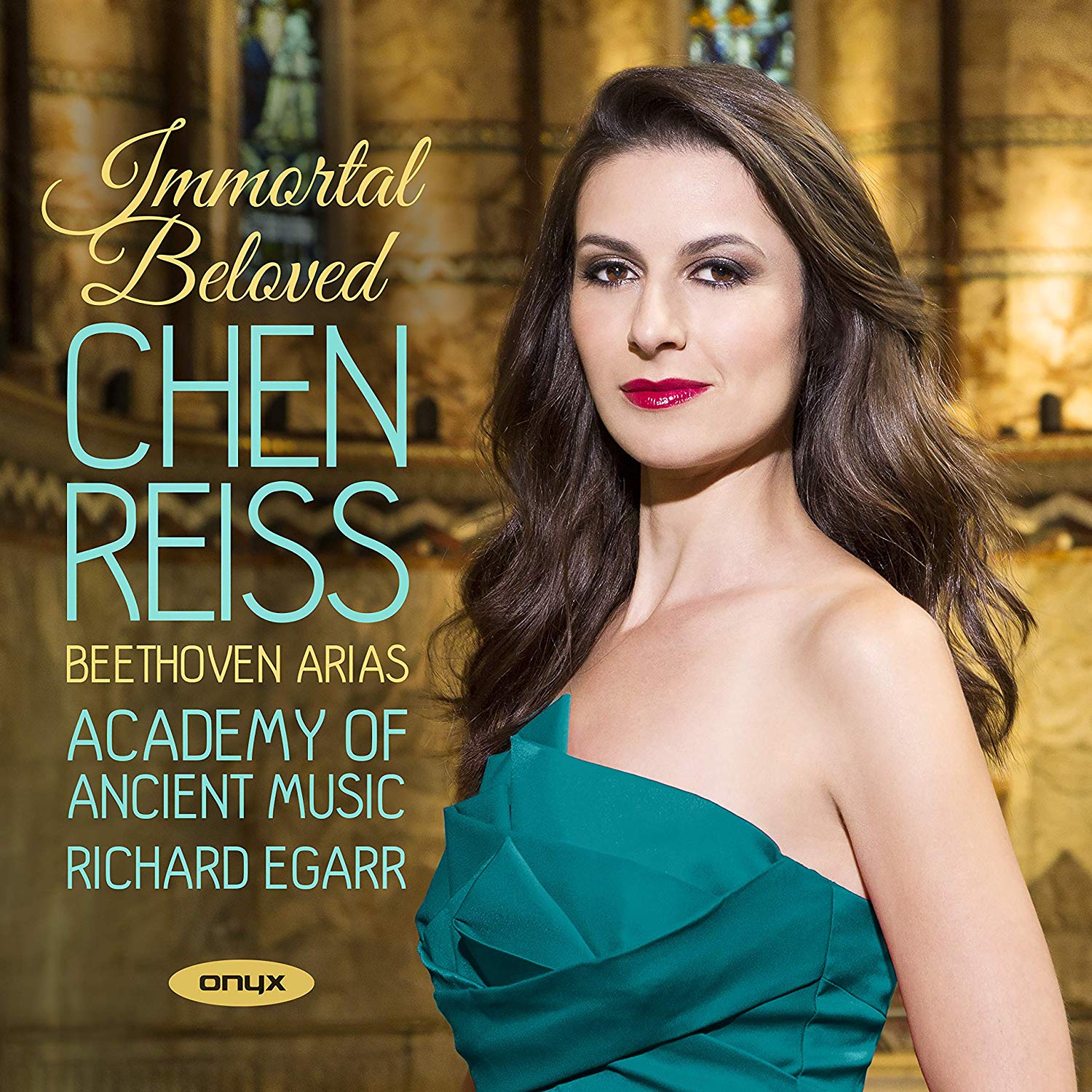Beethoven Arias
Chen Reiss soprano, Academy of Ancient Music, Richard Egarr, Oliver Wass harp
58:52
Onyx 4218
Click HERE to buy this on amazon.co.uk
The Israeli soprano Chen Reiss starts an interesting note by addressing the much aired question of Beethoven’s writing for the voice. Is it awkward and unidiomatic or, as she writes, does it feature ‘sequences that are uncomfortable to sing, that don’t sit where the voice (or the audience) would like them to sit’? I think there are elements of truth in both viewpoints and there are surely also reservations to be made regarding Beethoven’s handling of larger scale vocal forms in his earlier works. Both in the case of the aria ‘Fliesse, Wonnezähre, fliesse’, set to an embarrassingly banal text as a part of an unperformed Cantata for the Accession of Leopold II, WoO 88 in 1790 and the large scale scena ‘Primo amore’ WoO 92 (1790-92), possibly associated with Beethoven’s own ‘first love’ (Reiss and the notes by Andrew Stewart disagree on the identity of the lady in question) show Beethoven producing overblown settings that display all the indiscipline of talented, over-reaching youth. It is perhaps not without significance that the most impressive aspect of ‘Fliesse’ is the concertante writing for flute and cello.
Far superior is the more modestly proportioned (and therefore more effective) scena ‘No, non turbati’, WoO 92a, one of several texts by Metastasio that Beethoven set or worked on while he was studying vocal composition with Salieri around the turn of the century. Here Beethoven responds to the lover’s turmoil in the stormy recitative, while finding Mozartian eloquence in the succeeding aria. Mozart – in the form of Die Entführung’s Blondchen – also comes to mind in the delightful aria ‘Soll ein Schuh’, an insert in the Singspiel Die schöne Schusterin by Umlauf. And talk of Blondchen leads to Marzelline in Fidelio, whose ‘O wär’ ich schon’ finds her daydreaming of an imagined future life with ‘Fidelio’.
In addition to the works mentioned above Reiss includes another rarity in the shape of the Romanza, WoO 96, one of four pieces of incidental music Beethoven wrote for the Johann Duncker’s tragedy Leonora Prohaska in 1815, in addition to better known fare in the shape of Clärchen’s songs from the incidental music to Egmont and the great scena ‘Ah, perfido’, op 65.
Chen Reiss has built up a considerable reputation in Europe in recent years, where she is currently a member of the Vienna State Opera. Her vocal quality is unusual in that it has a warm, burnished beauty that has made her an admired interpreter of Richard Strauss, while equally owning a tonal security, purity and flexibility that allows her to sing earlier music (I heard her as a sensitive Ginevra in Handel’s Ariodante in Vienna at the end of 2019). This applies particularly to a middle register that is sumptuous yet also refined, though the upper register can have a tendency to become shrill when pushed. Her singing of all the music on the present CD is extremely rewarding, with considerable sensitivity brought to ‘Ma tu tremi’, the aria from WoO 92a, the humour of the Singspiel aria about the pleasures of a new pair of shoes nicely caught. Above all Reiss rises splendidly to the greater challenges of ‘Ah, perfido’, the words ‘Ah no!, ah no! fermate’ in the recitative inflected with real meaning, while in the succeeding aria the mezza voce at the words ‘io d’affano morirò’, the last carrying a hint of portamento, is deeply touching.
The Academy of Ancient Music under Richard Egarr provide unfailingly sympathetic support, as does Oliver Wass’ solo harp in the song from Leonora Prohaska, to which Reiss appropriately gives a more intimate feel.
With its unusual repertoire and excellent performances this bids fair to become one of the more attractive offerings of the Beethoven anniversary.
Brian Robins
